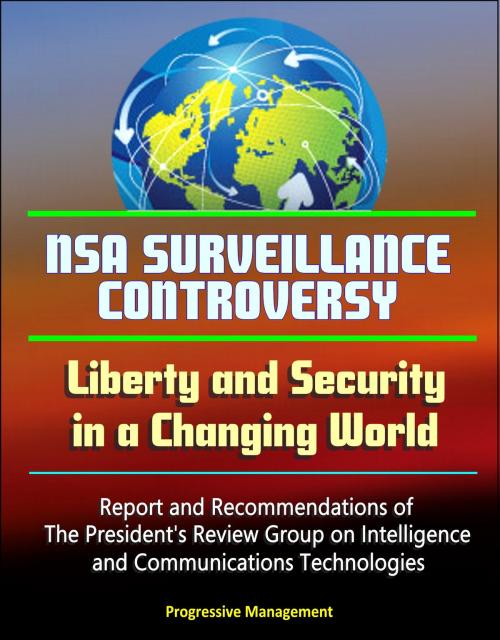NSA Surveillance Controversy: Liberty and Security in a Changing World - Report and Recommendations of The President's Review Group on Intelligence and Communications Technologies
Nonfiction, Social & Cultural Studies, Political Science, Politics, Law Enforcement| Author: | Progressive Management | ISBN: | 9781310763304 |
| Publisher: | Progressive Management | Publication: | December 20, 2013 |
| Imprint: | Smashwords Edition | Language: | English |
| Author: | Progressive Management |
| ISBN: | 9781310763304 |
| Publisher: | Progressive Management |
| Publication: | December 20, 2013 |
| Imprint: | Smashwords Edition |
| Language: | English |
Released in mid-December 2013 by the Obama White House, this important report discloses the findings and recommendations of the panel investigating the National Security Agency's surveillance programs revealed by Edward Snowden. The report includes forty-six recommendations for reforming intelligence collection activities. The report states: In many areas of public policy, officials are increasingly insistent on the need for careful analysis of the consequences of their decisions, and on the importance of relying not on intuitions and anecdotes, but on evidence and data. Before they are undertaken, surveillance decisions should depend (to the extent feasible) on a careful assessment of the anticipated consequences, including the full range of relevant risks. Such decisions should also be subject to continuing scrutiny, including retrospective analysis, to ensure that any errors are corrected. With respect to surveillance of US Persons, we recommend a series of significant reforms. Under section 215 of the Foreign Intelligence Surveillance Act (FISA), the government now stores bulk telephony metadata, understood as information that includes the telephone numbers that both originate and receive calls, time of call, and date of call. (Meta-data does not include the content of calls.). We recommend that Congress should end such storage and transition to a system in which such metadata is held privately for the government to query when necessary for national security purposes. In our view, the current storage by the government of bulk meta-data creates potential risks to public trust, personal privacy, and civil liberty. We recognize that the government might need access to such meta-data, which should be held instead either by private providers or by a private third party.
Contents: Preface * Executive Summary * Recommendations * Chapter I: Principles * Chapter II: Lessons of History * A. The Continuing Challenge * B. The Legal Framework as of September 11, 2001 * C. September 11 and its Aftermath * D. The Intelligence Community * Chapter III: Reforming Foreign Intelligence Surveillance Directed at United States Persons * A. Introduction * B. Section 215: Background * C. Section 215 and "Ordinary" Business Records * D. National Security Letters * E. Section 215 and the Bulk Collection of Telephony Meta-data * 1. The Program * 2. The Mass Collection of Personal Information * 3. Is Meta-data Different? * F. Secrecy and Transparency * Chapter IV: Reforming Foreign Intelligence Surveillance Directed at Non-United States Persons * A. Introduction * B. Foreign Intelligence Surveillance and Section 702 * C. Privacy Protections for United States Persons Whose Communications are Intercepted Under Section 702 * D. Privacy Protections for Non-United States Persons * Chapter V: Determining What Intelligence Should Be Collected and How * A. Priorities and Appropriateness * B. Monitoring Sensitive Collection * C. Leadership Intentions * D. Cooperation with Our Allies * Chapter VI: Organizational Reform in Light of Changing Communications Technology * A. Introduction * B. The National Security Agency * 1. "Dual-Use" Technologies: The Convergence of Civilian Communications and Intelligence Collection * 2. Specific Organizational Reforms * C. Reforming Organizations Dedicated to the Protection of Privacy and Civil Liberties * D. Reforming the FISA Court * Chapter VII: Global Communications Technology: Promoting Prosperity, Security, and Openness in a Networked World * A. Introduction * B. Background: Trade, Internet Freedom, and Other Goals * 1. International Trade and Economic Growth * 2. Internet Freedom * 3. Internet Governance and Localization Requirements * C. Technical Measures to Increase Security and User Confidence * D. Institutional Measures for Cyberspace * E. Addressing Future Technological Challenges * Chapter VIII. Protecting What We Do Collect
Released in mid-December 2013 by the Obama White House, this important report discloses the findings and recommendations of the panel investigating the National Security Agency's surveillance programs revealed by Edward Snowden. The report includes forty-six recommendations for reforming intelligence collection activities. The report states: In many areas of public policy, officials are increasingly insistent on the need for careful analysis of the consequences of their decisions, and on the importance of relying not on intuitions and anecdotes, but on evidence and data. Before they are undertaken, surveillance decisions should depend (to the extent feasible) on a careful assessment of the anticipated consequences, including the full range of relevant risks. Such decisions should also be subject to continuing scrutiny, including retrospective analysis, to ensure that any errors are corrected. With respect to surveillance of US Persons, we recommend a series of significant reforms. Under section 215 of the Foreign Intelligence Surveillance Act (FISA), the government now stores bulk telephony metadata, understood as information that includes the telephone numbers that both originate and receive calls, time of call, and date of call. (Meta-data does not include the content of calls.). We recommend that Congress should end such storage and transition to a system in which such metadata is held privately for the government to query when necessary for national security purposes. In our view, the current storage by the government of bulk meta-data creates potential risks to public trust, personal privacy, and civil liberty. We recognize that the government might need access to such meta-data, which should be held instead either by private providers or by a private third party.
Contents: Preface * Executive Summary * Recommendations * Chapter I: Principles * Chapter II: Lessons of History * A. The Continuing Challenge * B. The Legal Framework as of September 11, 2001 * C. September 11 and its Aftermath * D. The Intelligence Community * Chapter III: Reforming Foreign Intelligence Surveillance Directed at United States Persons * A. Introduction * B. Section 215: Background * C. Section 215 and "Ordinary" Business Records * D. National Security Letters * E. Section 215 and the Bulk Collection of Telephony Meta-data * 1. The Program * 2. The Mass Collection of Personal Information * 3. Is Meta-data Different? * F. Secrecy and Transparency * Chapter IV: Reforming Foreign Intelligence Surveillance Directed at Non-United States Persons * A. Introduction * B. Foreign Intelligence Surveillance and Section 702 * C. Privacy Protections for United States Persons Whose Communications are Intercepted Under Section 702 * D. Privacy Protections for Non-United States Persons * Chapter V: Determining What Intelligence Should Be Collected and How * A. Priorities and Appropriateness * B. Monitoring Sensitive Collection * C. Leadership Intentions * D. Cooperation with Our Allies * Chapter VI: Organizational Reform in Light of Changing Communications Technology * A. Introduction * B. The National Security Agency * 1. "Dual-Use" Technologies: The Convergence of Civilian Communications and Intelligence Collection * 2. Specific Organizational Reforms * C. Reforming Organizations Dedicated to the Protection of Privacy and Civil Liberties * D. Reforming the FISA Court * Chapter VII: Global Communications Technology: Promoting Prosperity, Security, and Openness in a Networked World * A. Introduction * B. Background: Trade, Internet Freedom, and Other Goals * 1. International Trade and Economic Growth * 2. Internet Freedom * 3. Internet Governance and Localization Requirements * C. Technical Measures to Increase Security and User Confidence * D. Institutional Measures for Cyberspace * E. Addressing Future Technological Challenges * Chapter VIII. Protecting What We Do Collect















